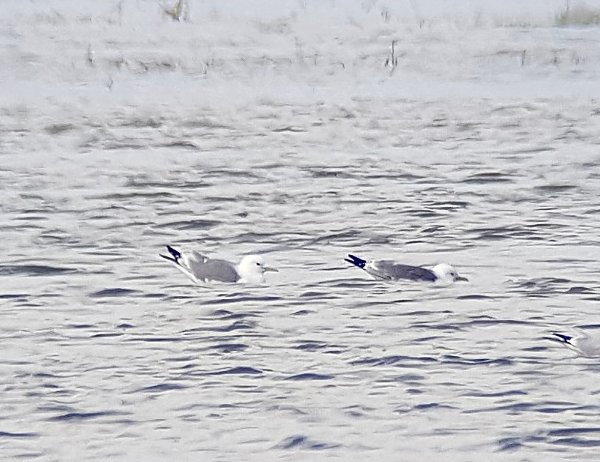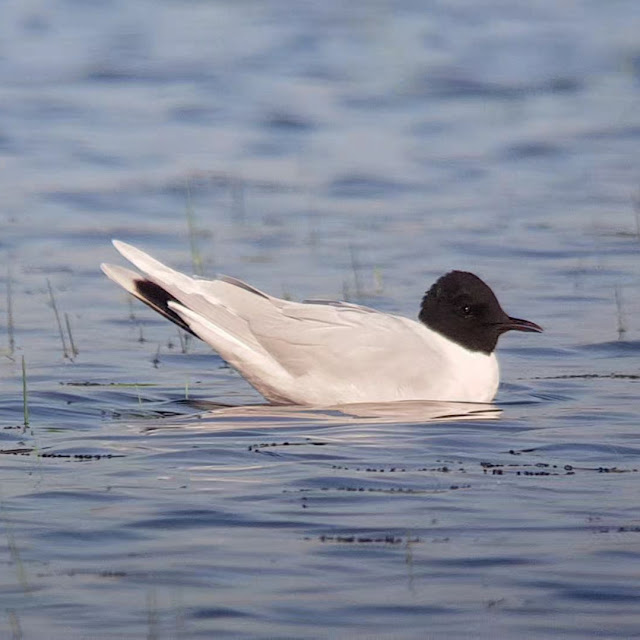It's time once again for the fashionably late end of year review for Port Meadow. And what a year it's been! The year list total has been absolutely smashed with a stonking 148 birds. Truly remarkable!
January is traditionally a fairly quiet month of gulling and catching up on winter residents but this year things started with a bang with a drake American Wigeon - a pretty rare county bird with only a handful of county records. Sadly the bird was only seen on the patch one evening by a single observer but it later relocated to Otmoor where it stayed quite a while.
 |
| The drake American Wigeon courtesy of Thomas Miller |
Apart from this star bird it was the usual Caspian Gulls with an adult Mediterranean Gull as an early season bonus. There were also a couple of White-fronted Geese which appeared to be genuine (though it's always hard to tell).
February, which is usually a quiet month, held a surprise Avocet for one morning on the floods. There were also more Caspian Gulls on the floods and up to two Siberian Chiffchaff hanging out by Burgess Field gate.
 |
| The Avocet, courtesy of Matthew Lloyd |
 |
| Siberian Chiffchaff courtesy of Matthew Lloyd |
More unusually, there was a single brief visit of a Willow Tit passing through the gardens near Kingston Road.
March is when things start to kick off with the first returning waders. In addition to this there was some really good gulling this month with loads of Caspian Gulls and several Mediterranean Gulls as well, mostly adults with one 2w bird one evening.
 |
| 1w Caspian Gull courtesy of Thomas Miller |
 |
| Two adult Med Gulls courtesy of Steve Lavington |
Spring migrants seemed to arrive early this year with the first Willow Warblers and White Wagtails quite a bit ahead of schedule. There were also another pair of White-fronted Geese that looked genuine. A fly-over Sandwich Tern was a really good record. There was another left-field record this month in the form of a Merlin (a patch Mega) being chased down Leckford Rd by a pair of Peregrine!
April is usually the most exciting month in terms of migrant arrivals and this year was no exception. Apart from the usual fare we had a Grey Plover (more usually seen in May) and an amazing record of a fly-over Mandarin Duck (a patch Mega) seen by a couple of lucky observers. There was still some good gulling to be had when the Meadow got in on the influx of Kittiwakes to the county when two birds turned up one morning.
 |
| The two Kittiwakes, courtesy of Steve Lavington |
We also had numerious Garganey records this spring. This species is always a delight to see.
 |
| Courtesy of Thomas Miller |
We also had a couple of flocks of 6 Arctic Tern fly over. This is another rare Meadow bird but thanks to increased vis mig coverage this year we managed to get it on the list. A delightful flock of 13 Little Gulls dropped in on the Meadow for a short while.
 |
| One of the Little Gulls courtesy of Thomas Miller |
Other noteworthy records this month was our first Osprey sighting, an usually late Short-eared Owl and the first Cattle Egret of the year. We also managed to get Wood Sandpiper and Whimbrel on the year list through a couple of birds that didn't stay long or just flew through.
The star bird of the month however was a singing male Wood Warbler in Burgess Field. This species is annual in the county, almost always in spring but usually just a single observer, hard to twitch, sighting. So to get one passing through Port Meadow was quite something!
 |
| The Wood Warbler, courtesy of Pete Roby |
We also managed to get Redstart on the year list in spring. Normally autumn is when we get this species, so that was rather unusual.
May is usually quieter but when we often get the rarer wader species and a Bar-tailed Godwit duly obliged along with our second Grey Plover of the year.
 |
| Bar-tailed Godwit courtesy of Matthew Lloyd |
 |
| Grey Plover courtesy of Thomas Miller |
There were also a couple more Osprey sightings, one of which was twitchable as it lingered for about an hour. Great White Egret made it onto the year list as well. We also had a Nightingale singing along the canal one evening. This is a rare patch and county species though over the years there have been a few records along the canal.
June was quiet on the birding front as you would expect though we did get a fly-over Crossbill record, a real patch Mega! Our Little Owls bred again this year and it was a delight to see the youngster being fed at dusk. On the Odonata front we had a good season once again with Downy Emerald seen again, as well as Small Red-eyed Damselfly and several Hairy Hawkers along with the usual species.
July and August were quiet with a Redstart and a Spotted Flycatcher the pick of the birds along with the first returning Common Sandpipers.
September was also a quiet month with just another Redstart to show for it. Cattle Egrets started to be seen in greater numbers and the Willow Emeralds appeared in the Trap Grounds once again.
 |
| Trap Grounds Willow Emerald |
October was also quiet though at least we got the floods back and had more gulls to look at.
 |
| 1w Caspian Gull courtesy of Steve Lavington |
There were two stand-out records this month: firstly a Marsh Harrier was spotted over Wytham Hill. This is yet another Patch Mega. Another good records was a Rock/Water Pipit fly-over that was never nailed down to exact species.
After a very quiet autumn, it was left to November to bring in some good birds. This happened in no small measure when an amazing record of a red-head Smew was found on the much extended flood waters. A truly incredible record!
 |
| The red-head Smew courtesy of Steve Lavington |
The swollen floods also drew in both Pochard and Red-crested Pochard. As diving ducks these are comparatively rare on the patch. There was more good gulling with quite a few Caspian Gulls and another (our third of the year) fly-over Grey Plover. A ringed Siberian Chiffchaff was an excellent record for Burgess Field.
 |
| Siberian Chiffchaff courtesy of Thomas Miller |
After the excitment of November, things got pretty quiet again for December though there was an amazing record of a Marsh Harrier (our second of the year!!) hunting over the floods briefly.
 |
| The Marsh Harrier courtesy of Matthew Lloyd |
The ringed Siberian Chiffchaff stuck around and a second unringed bird was seen in Burgess Field one afternoon.
So that was 2023. As you can see, most of the action happened in the first half of the year though there was just enough of interest in the second half to keep things ticking over. In terms of bird of the year it has to go to the American Wigeon though the Smew, the Wood Warbler, the two Kittiwakes and the Marsh Harriers the certainly deserve honerable mentions.
So it only remains for me to wish readers of this blog a Happy New Year and for me to thank the many dedicated birders who work the Port Meadow patch alongside me. Here's to another amazing patch year for 2024!
